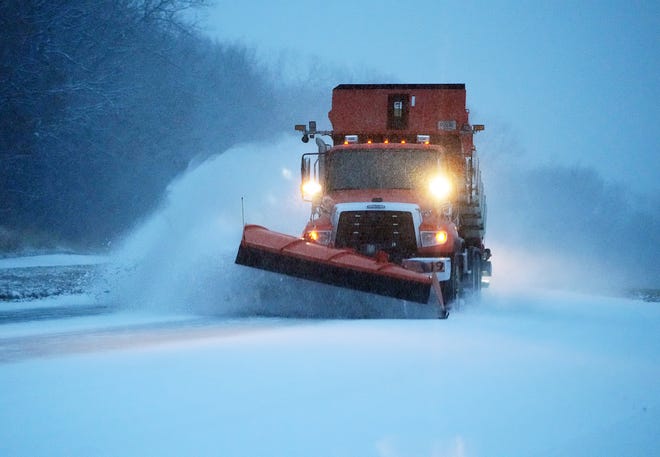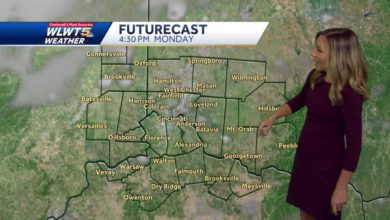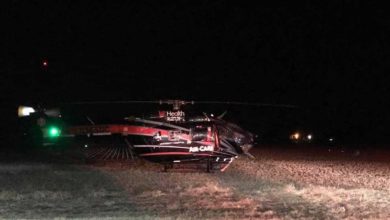
A severe weather outbreak threatened the south-central U.S. as strong thunderstorms and multiple tornadoes hit the region Tuesday, while what AccuWeather called an "atmospheric fire hose" was forecast to hammer the West.
Bracing for a week of wild, dangerous weather, the National Weather Service issued tornado watches in large swaths of the south-central, specifically in Louisiana and Mississippi where the weather service warned of “a particularly dangerous situation.” Watches are in effect until early Wednesday.
“Parameters appear favorable for strong and long-tracked tornadoes this afternoon and early evening,” the weather service said, emphasizing northeast Louisiana and central Mississippi.
Residents in several towns across Louisiana and Mississippi took cover as tornado sirens blared late Tuesday, and forecasters warned of the threat of strong twisters capable of tracking long distances on the ground as a severe weather outbreak erupted in the Deep South.
Multiple tornado warnings were issued starting Tuesday afternoon and continuing into the nighttime hours as heavy thunderstorms rolled from eastern Texas to Georgia and as far north as Indiana. The National Weather Service confirmed that tornadoes hit the ground in Mississippi on Tuesday evening and Alabama was in the forecast path of the storms during the overnight hours.
Local officials across the region gave early reports of structural damages after tornadoes made ground.
The long-track tornadoes could produce wind gusts of up to 165 mph. As a precaution, some Mississippi public school districts ended classes and activities early, and Mississippi State University in Starkville switched to online instruction.
The combination of storms forecasters are predicting could fuel major travel disruptions, such as the temporary closing of runways at Minneapolis-St. Paul International Airport on Tuesday afternoon because of snow and impaired visibility.
Forty million people from Indiana and Illinois down to Texas were at risk for severe thunderstorms and possibly tornadoes on Tuesday alone, AccuWeather said. The National Weather Service warned that severe weather was likely Tuesday across a swath of the Mississippi Valley: Arkansas, Illinois, Kentucky, Louisiana, Mississippi, Missouri and Tennessee.
The weather service's Indianapolis office warned on Twitter that "damaging winds will be the primary threat with lightning and isolated weak tornadoes also possible." The Chicago office cited the "threat for isol'd gusts strong enough to down tree limbs."
WHAT IS A NOR'EASTER?Storms can batter East Coast with snow, impact millions of people

Structural damages reported as tornadoes touch down across South
Major structural damages were reported across the South as twisters hit the region late Tuesday.
Local officials reported that a large metal barn was destroyed and ripped up by the storms in Leighton, Alabama. The tornado moved across the Alabama state line into the western part of Mississippi where a nearby church had a steeple blown over in Lowndes County.
In Caldwell Parish, Louisiana, Sheriff Clay Bennett confirmed two people were injured from a tornado that damaged several homes. Trees were also reported to have fallen on homes in the parish as debris flew through the air.
Tornadoes hit Mississippi, central Louisiana
The Storm Prediction Center issued a tornado watch for portions of Mississippi, Louisiana, and Arkansas which will be in effect until early Wednesday.The region can expect several tornadoes, damaging winds, hail, and strong thunderstorms through the night, the center added.
A tornado was first spotted in central Mississippi Tuesday afternoon near the town of Vaiden, about 80 miles northeast of Jackson. The storm was reported to be moving northeast at 50 mph at the time, according to AccuWeather. Hail, the size of tennis balls, was also reported in the region.
Two other tornadoes were confirmed to have hit Mississippi Tuesday The weather service said a tree fell onto a house due to a twister in Choctaw County, about 100 miles northeast of Jackson.
A large and destructive tornado spun through Caldwell Parish, Louisiana, around 7:15 p.m. local time. The weather service confirmed damages in the southeast portion of the parish.
Wind gusts could reach 85 mph; outages could target 125M people
A storm triggering severe weather and possible tornadoes in parts of the South from Tuesday to Wednesday will bring a blast of high winds as colder air sweeps from the Midwest to the Northeast, AccuWeather meteorologists warned. High winds and heavy snow in some areas could trigger power outages and travel delays.
More than 125 million people from the Midwest to the Northeast could face wind gusts of up to 85 mph, AccuWeather said.
THOUSANDS OF FLIGHTS DELAYED:30M at risk for tornadoes, severe storms

Pacific Coast braces for heavy snow, driving rains
Toward the West, a strong cold front accompanied by powerful winds and heavy snow was sweeping across portions of the Upper Midwest on Tuesday.
"Heavy snow will develop over the parts of the Mississippi Valley and Upper Great Lakes, which has prompted Winter Storm Warnings and Winter Weather Advisories over the region," National Weather Service Meteorologist Paul Ziegenfelder said.
WHAT IS AN ATMOSPHERIC RIVER?These rivers of water vapor can extend thousands of miles.
The Pacific Coast won't be exempt from the wild weather. A burst of intense moisture known as an atmospheric river, or a plume of intense moisture, will take aim at part of the West Coast and move southward midweek, AccuWeather said. Seattle could see its first snow of the season, and an "intense" 8- to12-hour period of precipitation could bring dangerous conditions to western Washington from Tuesday night to Wednesday, forecasters said.

The storm will roll into Northern California on Wednesday into Thursday. Southern California could see excessive rains at week's end, AccuWeather warned.
WHAT IS THUNDERSNOW? Explaining how a thunderstorm can produce snow
"While the rain and mountain snow will be beneficial from a drought standpoint, enough can fall to lead to travel delays and disruptions," AccuWeather Meteorologist Haley Taylor said.
Contributing: The Associated Press
Source link








